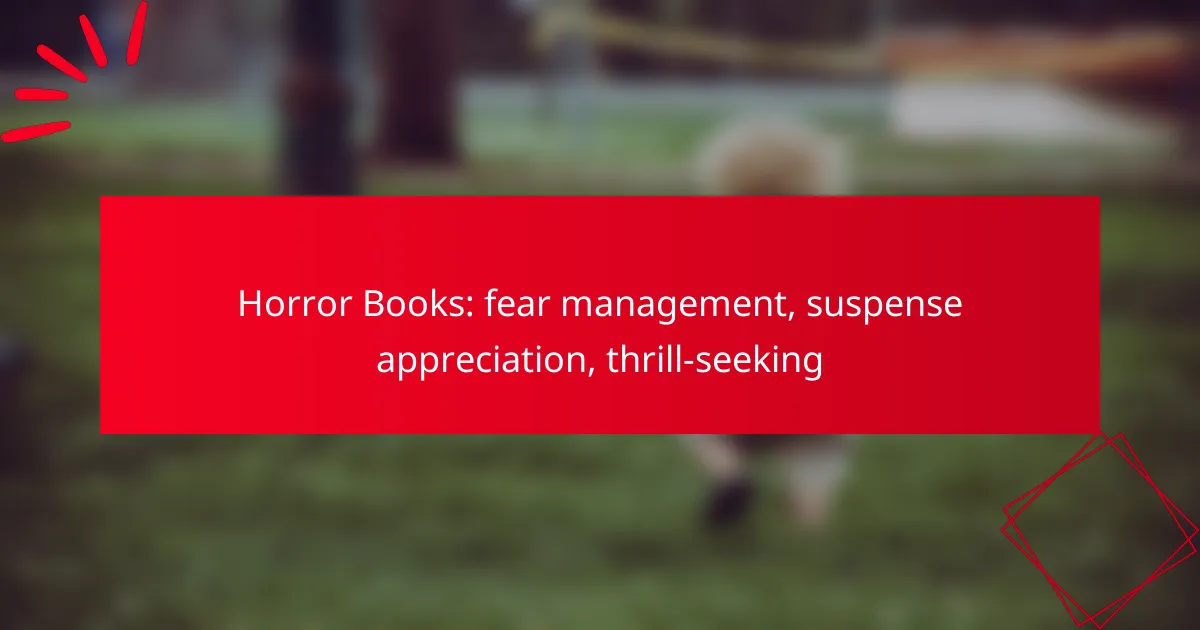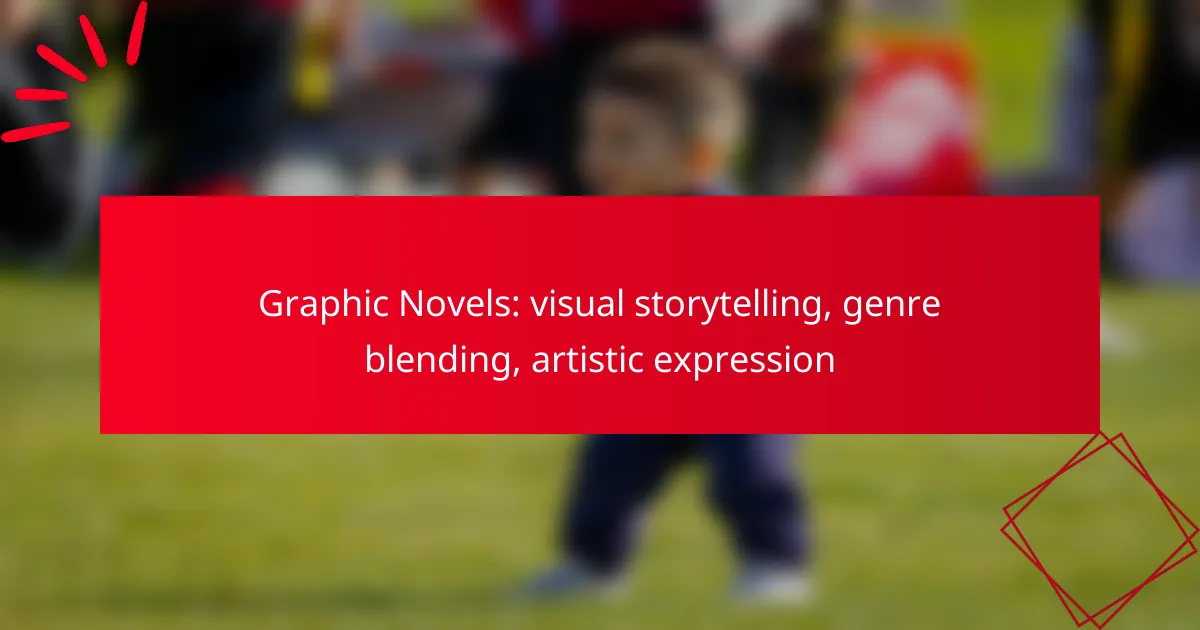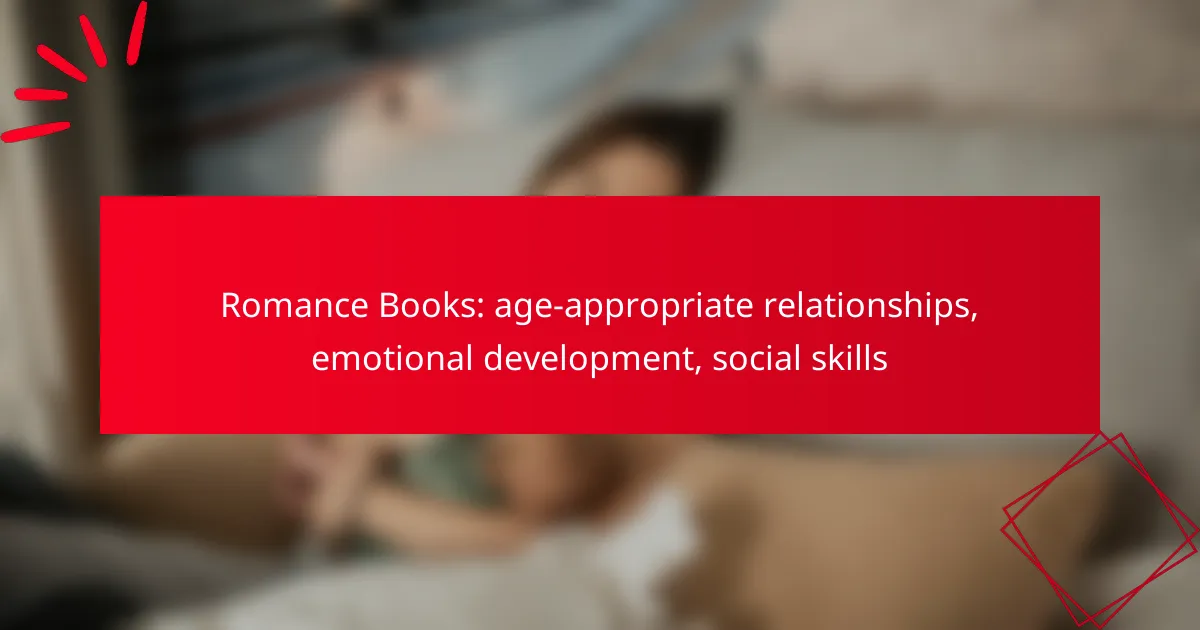
Romance Books: age-appropriate relationships, emotional development, social skills
Age-appropriate romance books for teens provide a valuable exploration of love, friendship, and personal growth, ensuring that the content remains suitable for younger audiences. These narratives not only foster emotional development but also enhance social skills, allowing readers to navigate relationships with empathy and understanding.
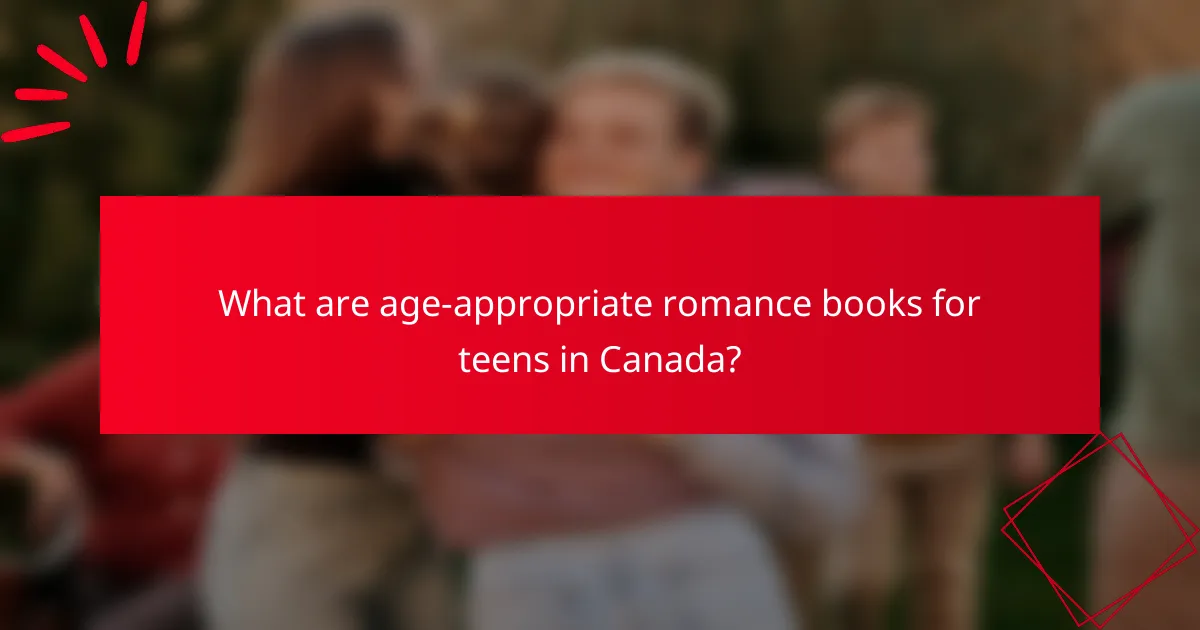
What are age-appropriate romance books for teens in Canada?
Age-appropriate romance books for teens in Canada typically focus on themes of love, friendship, and personal growth, while ensuring the content is suitable for younger audiences. These books often explore emotional development and social skills, helping teens navigate relationships in a healthy way.
Young Adult Fiction
Young adult fiction encompasses a wide range of stories that resonate with teenage readers, often featuring protagonists who face relatable challenges. These narratives frequently include romantic elements that are presented in a way that aligns with the emotional maturity of teens. Popular titles often address issues like self-discovery, peer pressure, and the complexities of first love.
When selecting young adult fiction, look for books that balance romance with character development and life lessons. Titles like “To All the Boys I’ve Loved Before” by Jenny Han or “The Fault in Our Stars” by John Green are examples that effectively blend romance with deeper themes.
Contemporary Romance
Contemporary romance for teens focuses on modern relationships and realistic scenarios. These stories often highlight the emotional growth of characters as they navigate love and friendships in today’s society. Themes such as acceptance, identity, and personal challenges are common, making them relatable for young readers.
Consider books that reflect diverse experiences and backgrounds, as this can enhance understanding and empathy. Titles like “Simon vs. the Homo Sapiens Agenda” by Becky Albertalli and “Everything, Everything” by Nicola Yoon provide engaging narratives that resonate with teen readers while addressing relevant social issues.
Fantasy Romance
Fantasy romance combines elements of magic and adventure with romantic storylines, appealing to teens who enjoy escapism. These books often feature fantastical worlds and characters, allowing readers to explore love in extraordinary settings. The romance is typically intertwined with quests or conflicts, adding depth to the relationships.
When choosing fantasy romance, look for stories that maintain a balance between the fantastical elements and emotional authenticity. Popular examples include “A Court of Thorns and Roses” by Sarah J. Maas and “Serpent & Dove” by Shelby Mahurin, which offer thrilling plots alongside compelling romantic arcs.
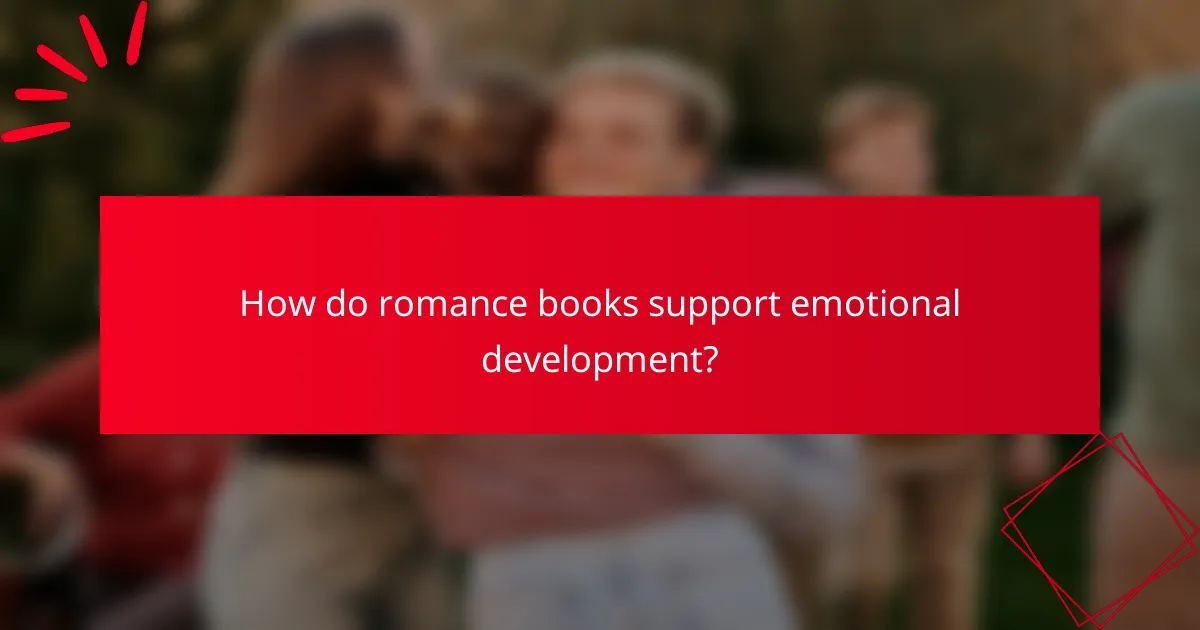
How do romance books support emotional development?
Romance books play a significant role in emotional development by allowing readers to explore complex feelings and relationships. Through relatable characters and scenarios, these stories can enhance understanding of one’s own emotions and those of others.
Understanding Relationships
Romance novels often depict various types of relationships, providing insights into dynamics such as trust, communication, and conflict resolution. Readers can observe how characters navigate challenges, which can inform their own relationship skills.
For example, a character’s journey through misunderstandings and reconciliations can illustrate the importance of dialogue and empathy in real-life interactions. This exposure helps readers recognize healthy versus unhealthy relationship patterns.
Empathy and Compassion
Engaging with the emotional experiences of characters fosters empathy and compassion in readers. By seeing the world through different perspectives, readers can develop a deeper understanding of others’ feelings and motivations.
Romance books often highlight themes of vulnerability and support, encouraging readers to practice kindness and understanding in their own lives. This emotional engagement can lead to stronger social skills and improved interpersonal relationships.
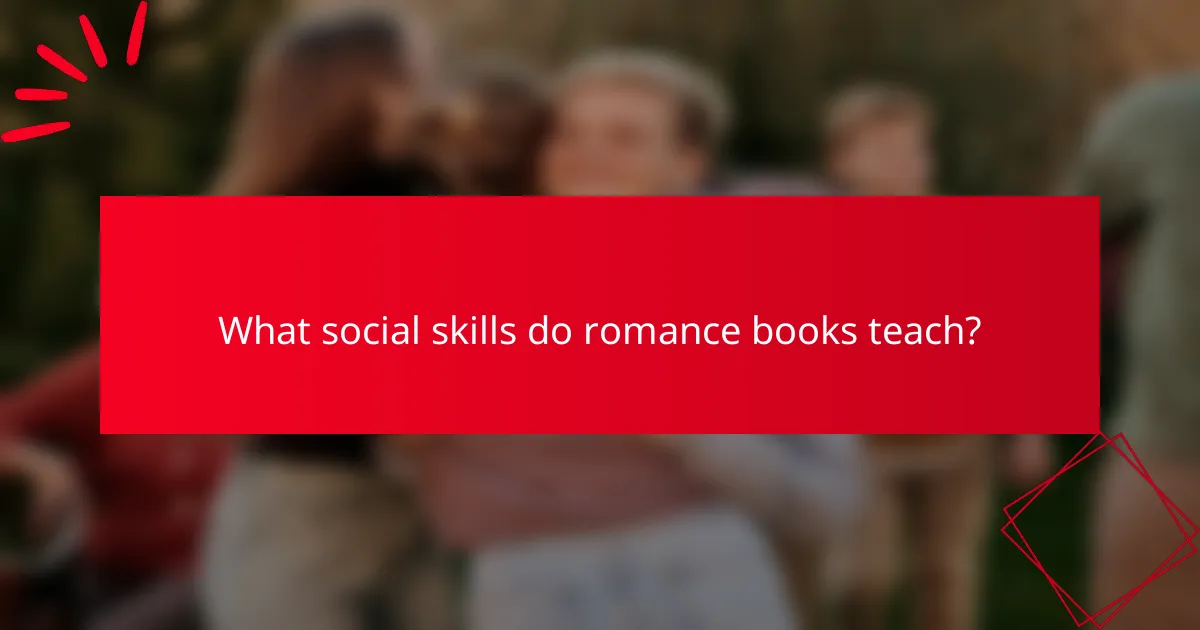
What social skills do romance books teach?
Romance books can teach valuable social skills by illustrating interpersonal dynamics and emotional intelligence through relatable characters and situations. Readers often learn about empathy, communication, and relationship management as they engage with the narratives.
Communication Skills
Romance novels often highlight the importance of effective communication in relationships. Characters frequently navigate misunderstandings, which can serve as examples of how to express thoughts and feelings clearly. Readers can learn to articulate their own emotions and needs, fostering healthier interactions.
For instance, dialogues in these books often showcase active listening and open-ended questions, which are essential for meaningful conversations. Practicing these techniques can enhance personal relationships and increase emotional connection.
Conflict Resolution
Conflict resolution is a recurring theme in romance literature, providing insights into managing disagreements constructively. Characters often face challenges that require negotiation and compromise, demonstrating the importance of finding common ground. This can help readers understand how to approach conflicts in their own lives.
Common strategies illustrated include acknowledging differing perspectives, using “I” statements to express feelings, and brainstorming solutions together. By applying these methods, individuals can improve their ability to resolve disputes amicably and strengthen their relationships.
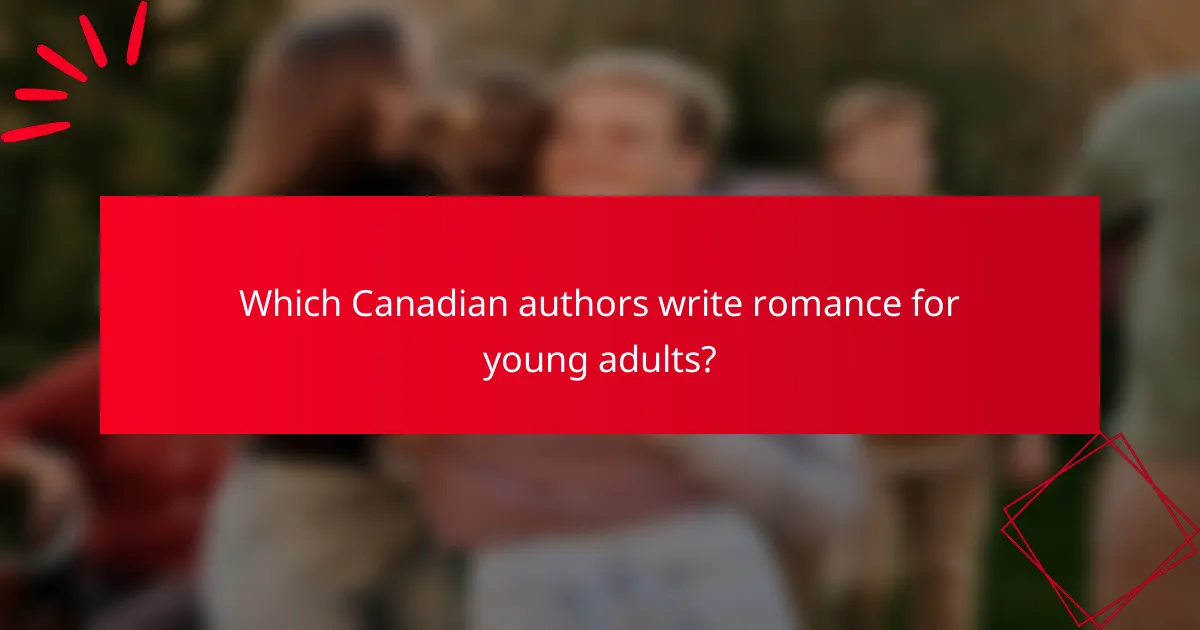
Which Canadian authors write romance for young adults?
Several Canadian authors are known for their engaging romance novels aimed at young adults, focusing on relatable themes of love, friendship, and personal growth. Notable figures include Sarah Dessen and Susin Nielsen, who craft stories that resonate with the emotional experiences of teenagers.
Sarah Dessen
Sarah Dessen is a prominent author in the young adult romance genre, celebrated for her ability to capture the complexities of teenage relationships. Her novels often explore themes of love, loss, and self-discovery, making them relatable to young readers navigating their own emotional journeys.
Some of her most popular titles include “Someone Like You” and “The Truth About Forever.” These books typically feature strong character development and realistic portrayals of romance, encouraging readers to reflect on their own experiences and relationships.
Susin Nielsen
Susin Nielsen is another influential Canadian author whose works often blend humor with poignant moments in young adult romance. Her stories frequently address social issues and personal challenges, providing a rich backdrop for romantic developments.
Notable works like “The Reluctant Journal of Henry K. Larsen” and “We Are All Made of Molecules” showcase her skill in creating relatable characters and situations. Nielsen’s writing encourages empathy and understanding, helping young adults develop social skills while engaging with romantic narratives.

How to choose the right romance book for a teen?
Selecting the right romance book for a teen involves considering their age, emotional maturity, and the themes presented in the story. Look for books that resonate with their experiences while promoting healthy relationships and emotional growth.
Age Appropriateness
When choosing a romance book for a teen, age appropriateness is crucial. Books should reflect the teen’s developmental stage, ensuring that the content is relatable and not overly mature. Generally, titles aimed at ages 12-15 should focus on light romance and friendship dynamics, while those for ages 16-18 can explore deeper emotional themes.
Consider the maturity level of the teen as well. Some may be ready for more complex relationships and situations, while others may prefer simpler, more innocent narratives. Always check content ratings or reviews to gauge suitability.
Themes and Topics
Themes in teen romance books can greatly influence emotional development and social skills. Look for stories that emphasize respect, consent, and healthy communication. These themes help teens navigate their own relationships and understand the importance of emotional intelligence.
Additionally, consider books that address relevant social issues, such as identity, friendship, and personal growth. These topics not only engage teens but also encourage them to reflect on their own lives and relationships. Popular themes include self-discovery, overcoming obstacles, and the complexities of first love.
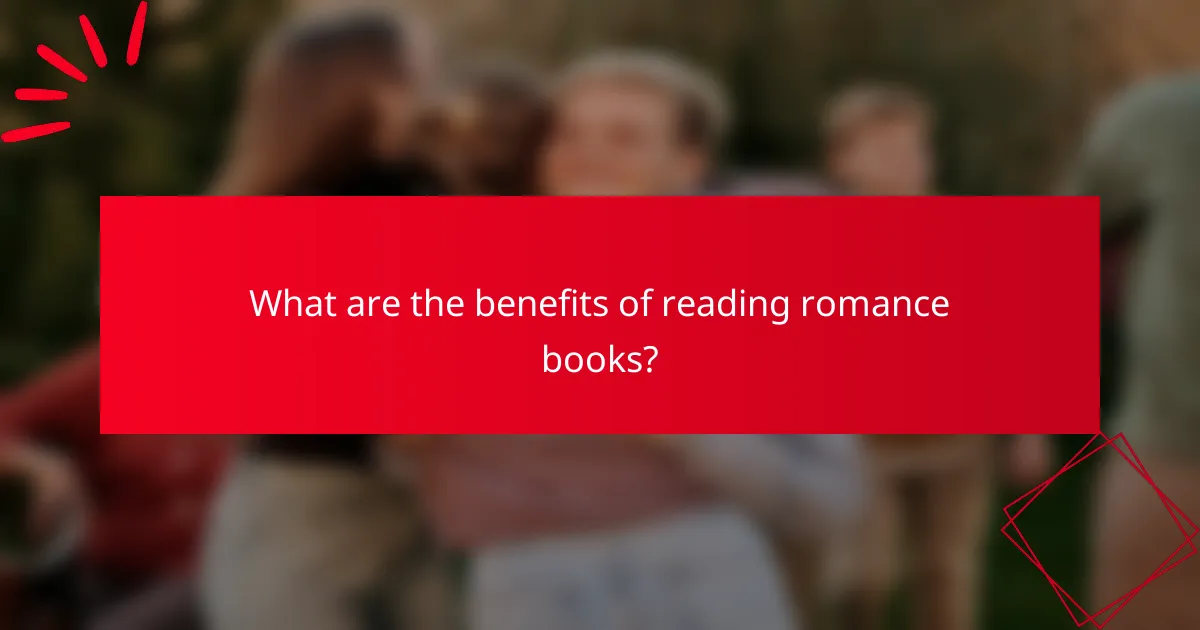
What are the benefits of reading romance books?
Reading romance books offers numerous benefits, including enhanced emotional development and improved social skills. These narratives allow readers to explore relationships and emotions in a safe environment, fostering personal growth and understanding.
Improved Emotional Intelligence
Romance books often delve into complex emotional landscapes, helping readers recognize and understand various feelings. By engaging with characters’ experiences, readers can develop empathy and learn to navigate their own emotions more effectively.
For instance, a character’s journey through heartbreak can resonate with readers, prompting them to reflect on their own experiences. This reflection can lead to greater emotional awareness and the ability to manage feelings in real-life situations.
Enhanced Social Awareness
Through the interactions and relationships depicted in romance novels, readers gain insights into social dynamics and communication styles. These stories often highlight the importance of understanding others’ perspectives, which is crucial for building healthy relationships.
By observing characters as they navigate conflicts or express affection, readers can learn valuable social skills. For example, recognizing the impact of verbal and non-verbal cues can help individuals improve their own interactions in everyday life.
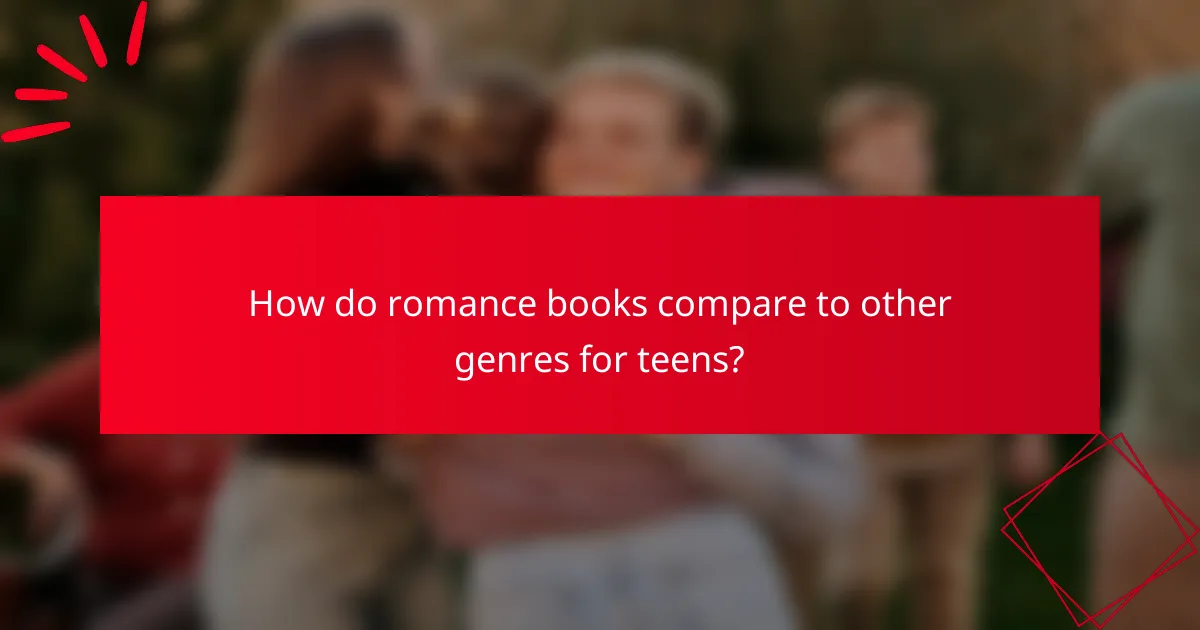
How do romance books compare to other genres for teens?
Romance books for teens often focus on emotional development and social skills, making them distinct from other genres. While mystery and science fiction may emphasize plot and world-building, romance centers on relationships and personal growth, which can be crucial during adolescence.
Romance vs. Mystery
Romance and mystery genres serve different purposes for teen readers. Romance novels typically explore relationships, emotional connections, and personal growth, while mystery novels focus on suspense, problem-solving, and plot twists. This difference can influence a teen’s emotional development and social skills.
For example, a romance book may encourage empathy and understanding through character interactions, whereas a mystery might enhance critical thinking and analytical skills. Teens interested in emotional narratives may gravitate more towards romance, while those who enjoy puzzles may prefer mysteries.
Romance vs. Science Fiction
When comparing romance to science fiction, the primary distinction lies in thematic focus. Romance novels emphasize interpersonal relationships and emotional journeys, while science fiction often explores futuristic concepts, technology, and speculative scenarios. This can affect how teens relate to the characters and situations presented.
In romance, readers may learn about love, trust, and conflict resolution, which are vital for social skills. In contrast, science fiction can inspire creativity and critical thinking about societal issues. Teens may benefit from reading both genres, as each offers unique insights into human experiences and relationships.
